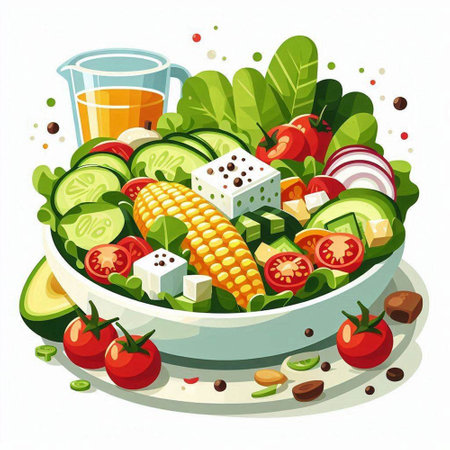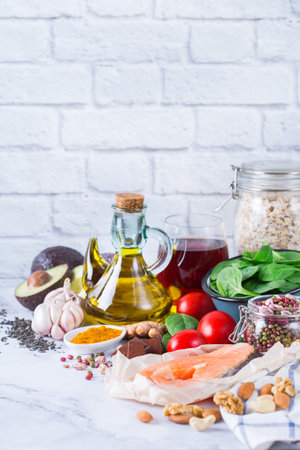Introduction to Anti-inflammatory Diets and British Food Culture
The concept of an anti-inflammatory diet has garnered significant attention in recent years, particularly for its potential role in supporting recovery and overall well-being. At its core, an anti-inflammatory diet emphasises the consumption of whole foods rich in antioxidants, healthy fats, lean proteins, and a variety of vitamins and minerals—while limiting processed items, added sugars, and unhealthy fats that may contribute to chronic inflammation. Traditionally, British cuisine is characterised by hearty ingredients such as root vegetables, grains like barley and oats, a variety of fish, and lean meats including lamb and chicken. While some may consider traditional British fare to be somewhat staid or even indulgent, there is growing recognition that many classic British dishes can align remarkably well with the core principles of anti-inflammatory eating. This article will explore how the foundational elements of an anti-inflammatory recovery diet can be thoughtfully integrated into traditional British cuisine, making it both culturally resonant and nutritionally supportive for those seeking to reduce inflammation during recovery.
2. The Science of Inflammation and Recovery
Understanding the link between diet, inflammation, and the body’s healing processes is essential for anyone seeking to optimise recovery, particularly within the context of British culinary traditions. Inflammation is a natural immune response that helps the body heal after injury or illness. However, when inflammation becomes chronic or excessive, it can hinder recovery and contribute to long-term health problems such as arthritis, cardiovascular disease, and even depression—issues frequently discussed within the UK’s NHS and healthcare community.
Certain foods can either exacerbate or help reduce inflammation. Traditional British cuisine offers both challenges and opportunities in this respect. Heavily processed foods, excessive saturated fats (as found in some fried dishes), and high sugar content are known to increase inflammatory markers. Conversely, ingredients rich in omega-3 fatty acids, antioxidants, and fibre—such as oily fish, root vegetables, and whole grains—are increasingly recognised by UK dietitians for their anti-inflammatory benefits.
The table below summarises key food groups commonly found in British diets and their impact on inflammation and recovery:
| Food Group | Traditional British Example | Inflammatory Impact | Recommendation |
|---|---|---|---|
| Oily Fish | Mackerel, Herring | Anti-inflammatory (rich in omega-3) | Include at least twice per week |
| Root Vegetables | Carrots, Parsnips | Anti-inflammatory (high in antioxidants) | Incorporate daily as part of meals |
| Whole Grains | Porridge oats, Barley | Anti-inflammatory (high in fibre) | Swap refined grains for wholegrain options |
| Processed Meats | Sausages, Black pudding | Pro-inflammatory (high in saturated fat) | Limit consumption; choose leaner proteins |
| Sugary Foods/Drinks | Cakes, Scones with jam | Pro-inflammatory (high sugar content) | Treat occasionally rather than daily |
This evidence-based approach aligns with guidelines from Public Health England and other UK bodies advocating for diets rich in plant-based foods, moderate in lean protein sources, and lower in processed items. By thoughtfully selecting traditional British ingredients and preparing them in ways that emphasise their natural anti-inflammatory properties, it is possible to create a recovery-focused eating plan that supports both heritage and health.

3. Identifying Anti-inflammatory Ingredients in British Staples
Traditional British cuisine may not immediately spring to mind when one thinks of anti-inflammatory eating, yet it features a wealth of ingredients celebrated for their healing properties. By closely examining the staples found in classic British fare, we can uncover a range of foods that support recovery and wellbeing. Central to this exploration are oily fish, root vegetables, and grains—each with distinctive nutritional profiles that offer anti-inflammatory benefits.
Oily Fish: The Power of Omega-3
British coastal traditions have long embraced oily fish such as mackerel, herring, and salmon. These species are naturally rich in omega-3 fatty acids—particularly EPA and DHA—which research consistently links to reduced inflammation throughout the body. Regular consumption of these fish, whether grilled, smoked, or baked in traditional recipes like kedgeree or fish pie, can help counteract inflammatory processes and promote joint and cardiovascular health.
Root Vegetables: Hearty and Healing
The British climate favours robust root vegetables like carrots, parsnips, swede (rutabaga), and beetroot, all of which feature prominently in beloved dishes from Sunday roasts to Cornish pasties. These vegetables provide complex carbohydrates, fibre, antioxidants such as beta-carotene, and a spectrum of vitamins—including vitamin C—that contribute to immune function and inflammation reduction. Beetroot, in particular, stands out for its high concentration of betalains and nitrates, compounds noted for their anti-inflammatory effects.
Whole Grains: Sustained Energy and Cellular Support
Grains have long been at the heart of British diets—think barley in stews, oats in porridge, and wholemeal bread accompanying many meals. Whole grains retain their bran and germ layers, offering higher levels of fibre, B-vitamins, and essential minerals compared to refined grains. Their low glycaemic index helps stabilise blood sugar levels—a crucial factor in managing chronic inflammation—and their phytonutrient content further supports cellular repair during recovery.
By thoughtfully selecting these quintessentially British ingredients within a recovery diet framework, it becomes possible to enjoy both the comforts of tradition and the science-backed benefits of an anti-inflammatory approach. This blend ensures that familiar foods can play a meaningful role in modern wellbeing strategies tailored to local tastes and cultural heritage.
4. Reinventing British Classics for Recovery
Traditional British cuisine is beloved for its comforting and hearty dishes, yet many classics can be high in saturated fats and refined carbohydrates, potentially exacerbating inflammation. However, with thoughtful modifications, these familiar favourites can be transformed into nourishing meals that actively support recovery and reduce inflammation. Below, practical guidance is provided for adapting staple dishes such as fish pie, Sunday roast, and vegetable soups to maximise their anti-inflammatory benefits.
Adapting the Fish Pie
The classic British fish pie can be reimagined by selecting oily fish like salmon or mackerel, both rich in omega-3 fatty acids known for their anti-inflammatory properties. Replace traditional mashed potato toppings with a mix of sweet potato and cauliflower mash to increase fibre and antioxidants while lowering the glycaemic load. Opt for olive oil instead of butter in the mash, and enrich the sauce with fresh herbs such as parsley and dill for added phytonutrients.
Modernising the Sunday Roast
The iconic Sunday roast can be adjusted to prioritise lean proteins and a variety of colourful vegetables. Choose skinless chicken or turkey breast over red meats to reduce saturated fat intake, and prepare roasted root vegetables—such as carrots, parsnips, and beetroot—with a drizzle of rapeseed oil rather than animal fat. Introduce cruciferous vegetables like Brussels sprouts or broccoli, which contain sulforaphane, a compound linked to reduced inflammation. Consider using wholegrain mustard in gravies and sauces for an extra anti-inflammatory kick.
Revamping Vegetable Soups
Vegetable soups are easily tailored for anti-inflammatory effects by focusing on seasonal produce and legumes. Swap out cream-based recipes for clear broths enriched with garlic, leeks, celery, and kale. Add lentils or split peas to boost protein content without relying on animal products. Spices such as turmeric and black pepper can be stirred in at the end of cooking to enhance both flavour and health benefits.
Comparison Table: Traditional vs Anti-inflammatory Adaptations
| Dish | Traditional Ingredients | Anti-inflammatory Adaptations |
|---|---|---|
| Fish Pie | Creamy white sauce, cod/haddock, mashed potato (white), butter | Oily fish (salmon/mackerel), olive oil-based sauce, sweet potato & cauliflower mash, fresh herbs |
| Sunday Roast | Beef/lamb with roast potatoes (in animal fat), limited veg variety | Skinless poultry or plant-based protein, mixed root & cruciferous veg roasted in rapeseed oil |
| Vegetable Soup | Cream base, simple veg (carrot/potato/onion) | Clear broth, seasonal veg & legumes (kale/lentils), turmeric & black pepper spice blend |
Practical Tips for Everyday Cooking
To seamlessly incorporate these adaptations into your daily routine, focus on sourcing local produce from British farmers’ markets where possible. Prepare ingredients in advance—such as chopping vegetables or poaching fish—to simplify mealtime assembly. Experiment with herbs native to Britain like thyme or watercress to further boost nutritional value while retaining traditional flavours. By making these small but significant changes to beloved recipes, you can enjoy the comforts of British cuisine while actively supporting an anti-inflammatory recovery diet.
5. Sample Meal Plans and Recipes
Overview of British-Inspired Anti-Inflammatory Meal Ideas
Adapting traditional British cuisine for an anti-inflammatory recovery diet involves thoughtful ingredient selection and creative preparation. By focusing on fresh, seasonal produce, lean proteins, and healthy fats commonly found in the UK, classic dishes can be transformed into nourishing meals that support recovery while celebrating local food culture.
Breakfast: Smoked Mackerel with Oatcakes and Wilted Greens
Start the day with smoked mackerel, a source of omega-3 fatty acids known for their anti-inflammatory benefits. Serve with traditional Scottish oatcakes (made with wholegrain oats) and sautéed spinach or kale. Add a squeeze of lemon for freshness and vitamin C.
Lunch: Chicken and Barley Broth
A modern take on the classic cock-a-leekie soup, this version uses free-range chicken, pearl barley (rich in fibre), leeks, carrots, and celery. Infuse with fresh thyme and parsley for added antioxidants. Avoid excess salt; instead, enhance flavour with herbs and a drizzle of cold-pressed rapeseed oil.
Dinner: Grilled Salmon with Roasted Root Vegetables
Salmon is another excellent source of anti-inflammatory omega-3s. Accompany it with roasted seasonal root vegetables such as parsnips, swede, and carrots tossed in extra virgin olive oil and sprinkled with fresh rosemary. Complete the plate with a watercress salad dressed in apple cider vinegar.
Recipe Highlight: Warm Beetroot & Lentil Salad
This vibrant salad combines British-grown beetroot (high in betalains) and green lentils (packed with plant-based protein). Toss together cooked beetroot wedges, lentils, rocket leaves, chopped walnuts, and crumbled goat’s cheese. Dress lightly with English mustard vinaigrette for an anti-inflammatory punch.
Snack Ideas
Opt for simple snacks such as sliced apples with almond butter or a small bowl of stewed Bramley apples flavoured with cinnamon. For something savoury, try homemade hummus served with carrot batons or rye crispbreads.
Beverage Suggestions
Instead of sugary drinks, choose herbal teas like chamomile or peppermint—both widely enjoyed in Britain—or infuse still water with cucumber and mint for a refreshing alternative.
These meal plans and recipes demonstrate how traditional British foods can be thoughtfully reimagined to fit an anti-inflammatory recovery approach without sacrificing cultural authenticity or taste.
6. Navigating British Food Culture Socially and Practically
Enjoying an anti-inflammatory recovery diet in the UK need not mean missing out on the rich tapestry of British social life. Whether it’s a Sunday roast with family, a meal at your local pub, or afternoon tea with friends, adapting traditional practices can foster both wellbeing and sociability.
Adapting to Pub Culture
Pubs are quintessentially British gathering places, but their menus often feature fried foods and processed meats. When meeting mates for a pint, look for grilled fish options (like grilled mackerel or salmon), jacket potatoes with beans, or salads dressed with olive oil. Opt for non-alcoholic options such as sparkling water with lemon or herbal teas, as alcohol can exacerbate inflammation. Don’t hesitate to ask staff about ingredient swaps—most pubs are happy to accommodate dietary needs these days.
Family Gatherings and Celebrations
Family meals frequently involve traditional fare such as roast dinners, pies, or puddings. To keep these occasions anti-inflammatory:
- Roast Dinners: Choose lean cuts of meat like turkey or chicken, serve generous portions of roasted root vegetables (parsnips, carrots), and use rapeseed or olive oil instead of animal fats.
- Pies and Pastries: Try making pies with wholemeal pastry and a filling rich in pulses and vegetables. Swap creamy sauces for tomato-based ones infused with herbs like rosemary and thyme.
- Desserts: Offer fruit crumbles made with oats and berries instead of sugary cakes. Use honey sparingly as a sweetener if needed.
Embracing Shared Rituals Mindfully
Social eating is as much about connection as food. Emphasise the enjoyment of conversation and togetherness rather than focusing solely on what’s on your plate. If you’re bringing a dish to share, introduce friends and family to anti-inflammatory twists on classics—such as smoked mackerel pâté on oatcakes or spiced lentil soup. By gently steering choices without being prescriptive, you can nurture both your recovery and your relationships within the uniquely British context.
7. Conclusion: Balancing Tradition and Health
Integrating anti-inflammatory principles into traditional British cuisine represents a thoughtful approach to honouring the nation’s culinary heritage while advancing personal wellbeing. By revisiting classic dishes—such as shepherd’s pie with added root vegetables, or swapping out saturated fats for healthier oils in a Sunday roast—we see that embracing modern nutritional science does not necessitate abandoning beloved flavours or cultural practices. This balanced method allows individuals recovering from illness or injury to benefit from the comforting familiarity of British food, whilst leveraging ingredients like oily fish, seasonal greens, and whole grains that support anti-inflammatory recovery. Ultimately, adapting time-honoured recipes with a health-conscious perspective fosters both cultural continuity and individual vitality, bridging the gap between tradition and contemporary dietary needs for the benefit of all generations.


